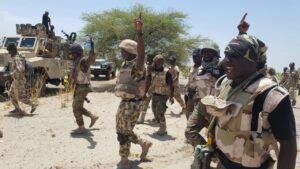
Defence College advocates gender responsive peace, security operations
The Commandant, National Defence College (NDC), Rear Adm. Olumuyiwa Olotu, has advocated for more women participation in peace, security and conflict management.
This could be promoted through gender responsive security operations, Olotu said on Wednesday in Abuja at the opening of a 3-day Gender Sensitization Workshop for senior military and security service officers.
The workshop has the theme, “Enhancing Gender Responsive Security Operations and Community Dialogue Project in Nigeria”.
The workshop was organised by the Centre for Strategic Research and Studies of the college, the National Institute for Legislative and Democratic Studies (NILDS) and UN Women.
The commandant said that such move would be in line with the UN Security Council Resolution (UNSCR) 1325, which mandates member states to foster inclusive and gender response security environment.
He said the workshop was another opportunity to mainstream the resolution in realising gender equality, protection of women and girls in conflict and their active involvement in conflict prevention, resolution and peace building.
According to him, the event formally marks the commencement of phase two of the UN Women Project for Nigeria Security Organisations.
“In spite some of the successes achieved, we must acknowledge that much remains to be done, and so we anticipate that this workshop will serve as a catalyst for change.
“As we delve into the intricacies of gender responsive security operations and community dialogue, let us keep in mind broader impact and effect on the armed forces and the nation at large.
“Our commitment to this cause is a testament of our dedication to upholding the principles of justice, human rights and sustainable peace.
“I therefore express my profound gratitude or participants, facilitators, the UN Women for their immense support and also pray that this workshop will be a source of inspiration, enlightenment and empowerment, propelling us towards the most secure and gender inclusive Nigeria,” he said.
The representative of the UN Women, Mr Peter Mancha, said the UNSCR1325 marked its 24th anniversary in October.
He said member countries were expected to develop a National Action Plan for women, peace and security to bridge existing gaps.
Mancha said it was discovered globally that there was a huge gender gap when it comes to women participation and representation in peace building and conflict prevention.
According to him, while women are excluded in the peace building processes, they are the majority that bear the brunt of conflicts.
“If you go to some of the IDP camps in Nigeria, you discover that significant population are either women or children.
“Because of patriarchal nature of our society and discriminatory nature of our society, we exclude women with the feeling that anything that has to do with peace and security should be limited to only men.
“So the UN Security Council resolution is saying we are underutilising the huge potentials that women have to contribute to peace and security, and they are saying for us globally now to achieve sustainable peace and security, women must be involved because they have value to add.
“There are conflicts that men could not resolve here in Nigeria, that the women were successfully able to resolve,” he said.
Mancha said the setting up of Mix Observers Group by the UN in the North East comprising female police and civil defence officers and female community leaders helped to address the issue of unreported cases of rape.
He said the UN Women would continue to support the Nigerian armed forces and other security agencies in the effort to mainstream gender in the nation’s security management.
The Director General of NILDS, Prof. Abubakar Sulaiman, who was represented by Dr Adewale Aderemi, said it was expected that the resolution of the workshop would translate into some form of legislation.
He said the institute intended to escalate the conversation to the national parliament and find ways to ensure that the nation’s gender policies were more intense.
He added that a lot had been done with regards to plugging the gender gap in security operations through multi stakeholder interventions and dialogue.
Defence College advocates gender responsive peace, security operations
The Commandant, National Defence College (NDC), Rear Adm. Olumuyiwa Olotu, has advocated for more women participation in peace, security and conflict management.
This could be promoted through gender responsive security operations, Olotu said on Wednesday in Abuja at the opening of a 3-day Gender Sensitization Workshop for senior military and security service officers.
The workshop has the theme, “Enhancing Gender Responsive Security Operations and Community Dialogue Project in Nigeria”.
The workshop was organised by the Centre for Strategic Research and Studies of the college, the National Institute for Legislative and Democratic Studies (NILDS) and UN Women.
The commandant said that such move would be in line with the UN Security Council Resolution (UNSCR) 1325, which mandates member states to foster inclusive and gender response security environment.
He said the workshop was another opportunity to mainstream the resolution in realising gender equality, protection of women and girls in conflict and their active involvement in conflict prevention, resolution and peace building.
According to him, the event formally marks the commencement of phase two of the UN Women Project for Nigeria Security Organisations.
“In spite some of the successes achieved, we must acknowledge that much remains to be done, and so we anticipate that this workshop will serve as a catalyst for change.
“As we delve into the intricacies of gender responsive security operations and community dialogue, let us keep in mind broader impact and effect on the armed forces and the nation at large.
“Our commitment to this cause is a testament of our dedication to upholding the principles of justice, human rights and sustainable peace.
“I therefore express my profound gratitude or participants, facilitators, the UN Women for their immense support and also pray that this workshop will be a source of inspiration, enlightenment and empowerment, propelling us towards the most secure and gender inclusive Nigeria,” he said.
The representative of the UN Women, Mr Peter Mancha, said the UNSCR1325 marked its 24th anniversary in October.
He said member countries were expected to develop a National Action Plan for women, peace and security to bridge existing gaps.
Mancha said it was discovered globally that there was a huge gender gap when it comes to women participation and representation in peace building and conflict prevention.
According to him, while women are excluded in the peace building processes, they are the majority that bear the brunt of conflicts.
“If you go to some of the IDP camps in Nigeria, you discover that significant population are either women or children.
“Because of patriarchal nature of our society and discriminatory nature of our society, we exclude women with the feeling that anything that has to do with peace and security should be limited to only men.
“So the UN Security Council resolution is saying we are underutilising the huge potentials that women have to contribute to peace and security, and they are saying for us globally now to achieve sustainable peace and security, women must be involved because they have value to add.
“There are conflicts that men could not resolve here in Nigeria, that the women were successfully able to resolve,” he said.
Mancha said the setting up of Mix Observers Group by the UN in the North East comprising female police and civil defence officers and female community leaders helped to address the issue of unreported cases of rape.
He said the UN Women would continue to support the Nigerian armed forces and other security agencies in the effort to mainstream gender in the nation’s security management.
The Director General of NILDS, Prof. Abubakar Sulaiman, who was represented by Dr Adewale Aderemi, said it was expected that the resolution of the workshop would translate into some form of legislation.
He said the institute intended to escalate the conversation to the national parliament and find ways to ensure that the nation’s gender policies were more intense.
He added that a lot had been done with regards to plugging the gender gap in security operations through multi stakeholder interventions and dialogue.



